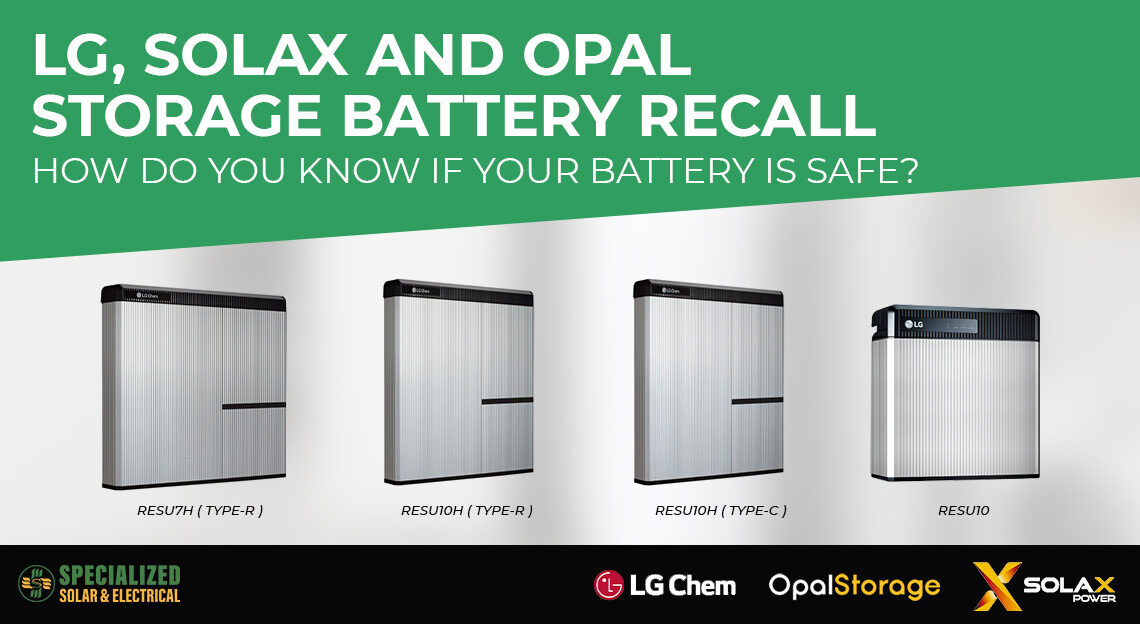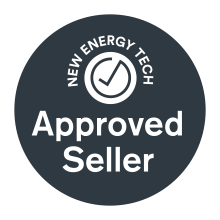LG has always been regarded as a good brand for batteries and solar panels in Australia. However, in the last month LG solar customers have been hit by an escalation of its Australian battery recall notice and the company’s decision to exit the global solar panel market.
At Specialized Solar, we’ve never supplied and installed LG batteries or solar panels. Not because we thought they were poor quality – just because we thought there were better alternatives for our customers.
So, like most of the industry, we were surprised by the recent bad news affecting LG customers – in particular, the battery recall. This news also affects customers with SolaX and Opal batteries, which are LG batteries under a different brand name.
On this blog we look at
- Why are LG batteries being recalled?
- Why is the recall notice being escalated?
- Which LG batteries are on the recall list?
- Who sold the batteries on the recall list?
- What should you do if your battery is on the recall list?
- How can you choose a solar battery that’s safe?
Why are LG batteries being recalled?
According to the Australian Government’s Product Safety website, the defect affecting LG batteries is that they may catch on fire. They state:
“If a battery overheats, it may catch on fire and cause injury or death and/or damage to property. Incidents have occurred and caused damage to property.”
Why is the recall notice being escalated?
The original recall notice was published in February 2021. However, the Australian Government published a new recall notice at the end of May 2022 for LG batteries which underlined the seriousness of the risk to property and human life.
The reason for this new notice is that the vast majority of affected LG, SolaX and Opal batteries are still in use in Australian homes. In total there were 7,200 affected LG batteries in Australia. It is estimated that there are still 6,400 of these batteries in Australian households that have not been replaced.
The Australian Government, quite rightly, is concerned that these battery owners aren’t aware of the recall notice and the danger their battery poses.
According to the ACCC since October 2019 there have been nine reported incidents involving these types of batteries in Australia resulting in property damage and one injury.
Which LG batteries are on the recall list?
Affected models include: RESU3.3, RESU6.5, RESU10, RESU13, RESU7H Type-R, RESU10H Type-C, RESU10H Type-R, RESU10H Type-R (Secondary), S/A Gen2 1P (EM048063P3S4), S/A Gen2 2P (EM048126P3S7).
If you have an LG battery, you can check whether the battery is affected by typing in the serial number on the LG battery website.
Who sold the batteries on the recall list?
Batteries on the recalled list were supplied by retailers, installers and distributors including AGL Energy, Baywa, CSR, Energy Australia, Krannich Solar, MMEM, One Stop Warehouse, Rheem, Solar Juice, SolaX, Sonepar (as Solar Plus Solutions) and Supply Partners according to the ACCC.
What should you do if your battery is on the recall list?
If you own an affected battery, immediately contact LG Energy Solution Australia on 1300 677 273 or email productau@lgensol.com to arrange an inspection. All affected batteries will be replaced for free according to LG.
Advice from the ACCC is that LG battery owners should switch off their battery storage systems until the affected battery has been replaced of the maximum state of charge has been reduced to 75%. Customers should contact LG for advice on how to safely switch off the battery.
How can you choose a solar battery that’s safe?
Most residential solar batteries are safe as long as you choose a quality battery and have it installed by a reputable Clean Energy Council accredited solar retailer employing fully accredited solar and battery installers.
Most residential solar batteries are lithium – either based on lithium nickel manganese cobalt (NMC) chemistry or lithium iron phosphate (LiFePO4) chemistry. The LG batteries under recall are based on NMC chemistry. But that doesn’t mean that batteries with NMC chemistry are inherently unsafe. The world’s most popular battery – the Tesla Powerwall – uses NMC chemistry.
Any battery made with lithium is potentially prone to something called ‘thermal runaway’. What this means is that if there’s a fault in the battery, it could cause the battery temperature to rise to the point where the battery could catch fire.
That’s why when choosing a battery, the most important questions to ask are:
- What built-in safety features does the battery have to reduce the risk of thermal runaway?
- What’s the reputation of the battery manufacturer in terms of safety? Have they been subject to any battery recall notices in the past?
- How much experience does the solar retailer and installer have with battery installations? Are they fully accredited? What evidence can they provide of their track record with batteries?
Get in touch
At Specialized Solar, we supply and installed leading battery brands from the world’s most reputable solar battery manufacturers including Tesla Powerwall, SolarEdge and Sungrow. These products are highly rated when it comes to safety with excellent built-in safety features.
For example, the SolarEdge Home Battery includes temperature sensors and a fire extinguisher. If the battery overheats, an alert will be sent via the SolarEdge monitoring system to the solar owner and installer. If the battery temperature becomes dangerously hot, the fire extinguisher will automatically activate and put out any fire.
If you’d like a quote for a solar battery with rock-solid safety features and excellent performance, get in touch.
Specialized Solar & Electrical is a Clean Energy Council Solar Retailer employing fully accredited solar and battery installers. We are also a Registered Electrical Contractor.
When it comes to solar and battery safety, we leave nothing to chance.












